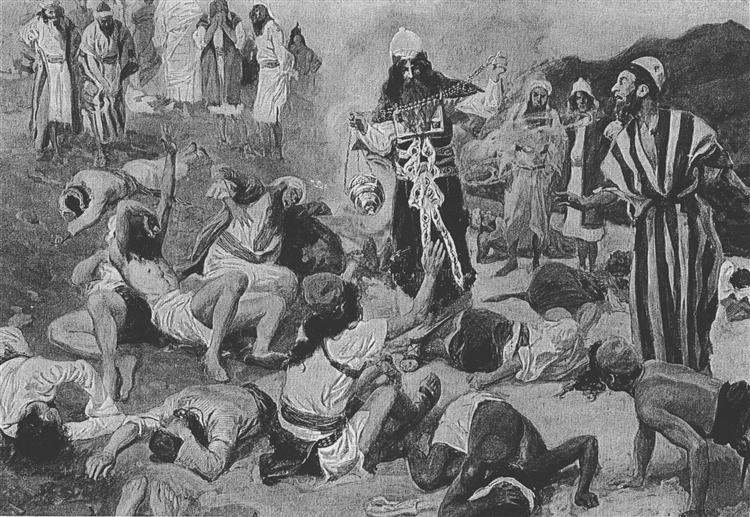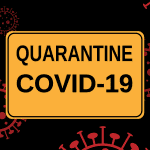For those unsettled by the coronavirus and are self-quarantining at home, those whose churches have shut down, and those pastors feeling a need to preach on the subject perhaps in an online service, I offer this survey of what the Bible says about plagues and pestilence and what they mean.
The key text for comfort and assurance in plague times is Psalm 91 (my bolds):
He who dwells in the shelter of the Most High
will abide in the shadow of the Almighty.3 For he will deliver you from the snare of the fowler
and from the deadly pestilence.
4 He will cover you with his pinions,
and under his wings you will find refuge;
his faithfulness is a shield and buckler.
5 You will not fear the terror of the night,
nor the arrow that flies by day,
6 nor the pestilence that stalks in darkness,
nor the destruction that wastes at noonday.7 A thousand may fall at your side,
ten thousand at your right hand,
but it will not come near you.
8 You will only look with your eyes
and see the recompense of the wicked.9 Because you have made the Lord your dwelling place—
the Most High, who is my refuge—
10 no evil shall be allowed to befall you,
no plague come near your tent.11 For he will command his angels concerning you
to guard you in all your ways.
12 On their hands they will bear you up,
lest you strike your foot against a stone.
13 You will tread on the lion and the adder;
the young lion and the serpent you will trample underfoot.14 “Because he holds fast to me in love, I will deliver him;
I will protect him, because he knows my name.
15 When he calls to me, I will answer him;
I will be with him in trouble;
I will rescue him and honor him.
16 With long life I will satisfy him
and show him my salvation.”Now this magnificent poem does not mean that the faithful–those who dwell “in the shelter of the Most High”–will not get the pestilence or suffer the other afflictions mentioned. Satan used this Psalm in his temptation of Jesus (Matthew 4:5-7), trying to get him to invoke its promise that angels “will bear you up” by throwing himself off from the pinnacle of the Temple. But such an interpretation, Jesus points out, would be to put God to the test, violating Deuteronomy 6:16. But those who trust God as their refuge will be delivered from the evil of the pestilence and from fear of it.
The Bible does describe plague and pestilence as manifestations of God’s wrath. Not only as His punishment but as signs–that is, as symbols–of His eternal anger against sin. This is evident throughout the prophecies of both the Old and New Testaments. For example, the “Song of Moses” in Deuteronomy 32:
For a fire is kindled by my anger,
and it burns to the depths of Sheol,
devours the earth and its increase,
and sets on fire the foundations of the mountains.23 “‘And I will heap disasters upon them;
I will spend my arrows on them;
24 they shall be wasted with hunger,
and devoured by plague
and poisonous pestilence.Plagues are also a sign, along with hostility to Christians, that we are and have been in the End Times, as Jesus Himself says:
10 Then he said to them, “Nation will rise against nation, and kingdom against kingdom. 11 There will be great earthquakes, and in various places famines and pestilences. And there will be terrors and great signs from heaven. 12 But before all this they will lay their hands on you and persecute you, delivering you up to the synagogues and prisons, and you will be brought before kings and governors for my name’s sake. 13 This will be your opportunity to bear witness. (Matthew 24)
And the Book of Revelation describes the judgments of the apocalypse in terms of pestilence and plagues:
7 When he opened the fourth seal, I heard the voice of the fourth living creature say, “Come!” 8 And I looked, and behold, a pale horse! And its rider’s name was Death, and Hades followed him. And they were given authority over a fourth of the earth, to kill with sword and with famine and with pestilence and by wild beasts of the earth. (Rev. 6:7-8)
15 Then I saw another sign in heaven, great and amazing, seven angels with seven plagues, which are the last, for with them the wrath of God is finished. (Rev 15:15)
But, along with this terrifying judgment of the Law, we also see the Gospel expressed in an Intercessor who stands between us and the plagues.
In Numbers 16, we have the familiar narrative of God punishing the Israelites in the wilderness for their rebellion by sending them a plague. But then Aaron the High Priest–a type and forerunner of Christ–makes atonement for them by means of the altar of sacrifice, and interposes himself “between the dead and the living”:
44 and the Lord spoke to Moses, saying, 45 “Get away from the midst of this congregation, that I may consume them in a moment.” And they fell on their faces. 46 And Moses said to Aaron, “Take your censer, and put fire on it from off the altar and lay incense on it and carry it quickly to the congregation and make atonement for them, for wrath has gone out from the Lord; the plague has begun.” 47 So Aaron took it as Moses said and ran into the midst of the assembly. And behold, the plague had already begun among the people. And he put on the incense and made atonement for the people. 48 And he stood between the dead and the living, and the plague was stopped. (Numbers 16)
In 2 Samuel 24, David, who has sinned by numbering the people, is given a choice of God’s judgments:
10 But David’s heart struck him after he had numbered the people. And David said to the Lord, “I have sinned greatly in what I have done. But now, O Lord, please take away the iniquity of your servant, for I have done very foolishly.” 11 And when David arose in the morning, the word of the Lord came to the prophet Gad, David’s seer, saying, 12 “Go and say to David, ‘Thus says the Lord, Three things I offer[e] you. Choose one of them, that I may do it to you.’” 13 So Gad came to David and told him, and said to him, “Shall three[f] years of famine come to you in your land? Or will you flee three months before your foes while they pursue you? Or shall there be three days’ pestilence in your land? Now consider, and decide what answer I shall return to him who sent me.” 14 Then David said to Gad, “I am in great distress. Let us fall into the hand of the Lord, for his mercy is great; but let me not fall into the hand of man.”
As we blogged about, Luther concluded from this passage that plagues are “the least evil” of the three and war is the worst, since God has mercy, unlike “pitiless man.” The account goes on, with the plague being stopped at the site where the Temple with its sacrifices would be built, as the sin and its punishment is assumed by David and his House; that is to say, by the Son of David:
15 So the Lord sent a pestilence on Israel from the morning until the appointed time. And there died of the people from Dan to Beersheba 70,000 men. 16 And when the angel stretched out his hand toward Jerusalem to destroy it, the Lord relented from the calamity and said to the angel who was working destruction among the people, “It is enough; now stay your hand.” And the angel of the Lord was by the threshing floor of Araunah the Jebusite. 17 Then David spoke to the Lord when he saw the angel who was striking the people, and said, “Behold, I have sinned, and I have done wickedly. But these sheep, what have they done? Please let your hand be against me and against my father’s house.” . . .
25 And David built there an altar to the Lord and offered burnt offerings and peace offerings. So the Lord responded to the plea for the land, and the plague was averted from Israel. . . .
Then Solomon began to build the house of the Lord in Jerusalem on Mount Moriah, where the Lord[a] had appeared to David his father, at the place that David had appointed, on the threshing floor of Ornan the Jebusite. (2 Chronicles 3:1)
David, the House of David, the Temple, and the whole sacrificial system point to Jesus, who heals our plagues:
21 In that hour he healed many people of diseases and plagues and evil spirits, and on many who were blind he bestowed sight. 22 And he answered them, “Go and tell John what you have seen and heard: the blind receive their sight, the lame walk, lepers[e] are cleansed, and the deaf hear, the dead are raised up, the poor have good news preached to them. 23 And blessed is the one who is not offended by me.” (Luke 7)
Image: “Fire of the Atonement” [Aaron and the Plague] (1896-1900) by James Tissot, Public Domain via Wikiart.org











